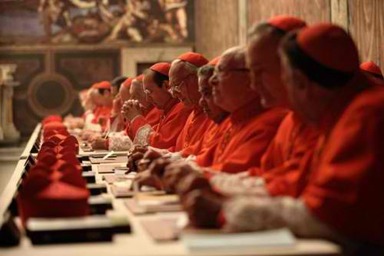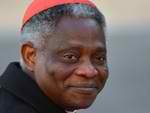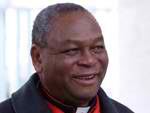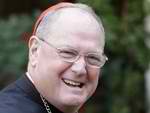
The pope is the spiritual, theological and political head of the oldest Christian tradition in the world. The new pope will have a dramatic impact on the next decade..or two or more, if he is young and healthy.
There are 115 voting cardinals; they are the “princes of the Church.” From amongst themselves, traditionally, they will choose the next one to lead the Church of Rome.
This conclave (which in Latin means “under key”) of the “college of cardinals” is locked away until a successor to Pope Benedict XVI is chosen. Usually the voting will take mere days. But this is not always the case.
One conclave lasted 33 months without a choice until the senators and people of Rome decided they would not feed the cardinals until a choice was made. Or so the story goes…
The people of Rome later acted again in the selection of a pope which led to disaster. After Pope Gregory XI died (1378), the Roman populace rioted to guarantee the election of an Italian for pope. The people had grown sick of the Papal throne residing in Avignon, France. That same year, the cardinals elected Bartolomeo Prignano, the Archbishop of Bari, who became Pope Urban VI.
However, the French cardinals soon began to complain about being forced to choose an Italian. They left Rome and held another conclave in Anagni where they elected Pope Clement VII. Clement chose Avignon once again as his papal seat.
The two popes excommunicated each other and Europe was in confusion. The emperors, kings and princes began to choose along national interests instead of religious ones.
Even after these two popes died, this split (called the “Great Western Schism”) continued. Another pope (Boniface IX) was elected after Urban VI died in Rome and Benedict XIII followed the French pope. This mess continued until moves began to be made to settle the situation.
In 1409, French and Italian cardinals with their followers from other nations abandoned both of their popes. They met for a council in Pisa, Italy, where they would choose a new pope together. They chose Alexander V who died in less than a year. The council was still in session and chose John XXIII.
Now there were three popes, excommunicating each other…for five more years.
Finally, the Council of Constance met in 1414, under the guidance of theologian Jean Gerson. The council obtained the resignations of John XXIII and Gregory XII of Rome. The council elected Martin V in 1415 who was recognized as legitimate by most every nation, except for Aragon in Spain. The “popes” in Avignon continued for 14 more years until the final French “pope” resigned. For Roman Catholic historians, however, when there was more than one “pope,” the popes in Rome are recognized as the official popes.
Now Pope John XXIII may sound familiar. Wasn’t the pope who called for Vatican Council II in the early 60’s named John XXIII? Indeed, he was. It was a shock when he chose the name of an “antipope” but this was his way of shutting a door on the schism and declaring “time to move on.” I think he also may have thought to continue some of the legacy of John XXII from back in 1324, a fresh thinker and innovative theologian. But my Roman Catholic friends may disagree.
It is said that some time after his election in 1958, Pope John went to the windows of his Vatican offices and threw them wide open. He turned to look at the cardinals and advisers in attendance and said, “We need a breath of fresh air.” Vatican II was the council that came out of that moment. Indeed he was fresh and innovative.
This is the kind of man and thinker that we may hope to see elected this time. After so much scandal and crisis in recent years and after the resignation (unheard-of for centuries) of Benedict XVI, it is time for some fresh air in the Church of Rome. We need another John XXIII.
And not just for Catholics but for people of good will in every religion and every denomination. Even agnostics and atheists should have a deep concern for this. The greatest popes wrote brilliant encyclicals on social welfare, health concerns, liberty and human rights.
I think especially of Leo XIII’s monumental “Rerum Novarum” which discussed the rejection of communism AND unrestricted capitalism; about the rights of workers and care for the poor. A good pope is good for the world.
There is excitement in this conclave. There are many front-runners in this elections and I must admit that I have some favorites.

Peter Turkson is the former archbishop of Ghana but now is the leader of the Pontifical Council for Justice and Peace. He is like the Vatican’s equivalent of a Supreme Court Chief Justice. He is laid back but young and full of energy. Unfortunately Cardinal Turkson, aged 64, has made a few bungles that may hurt his chances. I hope not.

John Onaiyekan is the archbishop of Abuja, Nigeria, and has been dubbed "the Timothy Dolan of Africa" by the National Catholic Reporter for his “big personality.” Cardinal Onaiyekan, aged 69, is intellectually and morally imposing and he successfully pushed for democratic elections in Nigeria.

Those are my three choices. They are the fresh air. Other cardinals bring great skills and qualities to bear but my money is on one of these three. I mean… my prayers are with these three.
This site and the material contained herein is protected by copyright and trademark laws under U.S. and International law. No part may be copied without written permission of the author.
© copyright 2011-2013. Travis Rogers, Jr. All rights reserved.
 RSS Feed
RSS Feed
